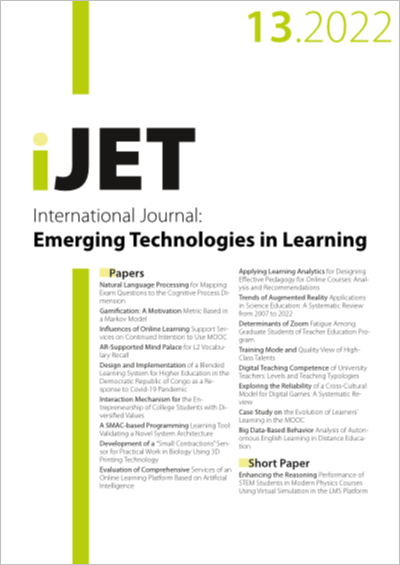Influences of Online Learning Support Services on Continued Intention to Use MOOC
DOI:
https://doi.org/10.3991/ijet.v17i13.32609Keywords:
online learning, learning support services, MOOC, continued intention to useAbstract
In this study, an undergraduate course in Wuhan City, China was chosen as the respondent and a questionnaire of influences of online learning support services on continued intention to use MOOC was designed. The influencing degree of four aspects of online learning support services (education teaching, curriculum resources, learning facilities and management services) on continued intention to use MOOC were analyzed. Moreover, differences in continued intention to use under various online learning contact time were discussed. Results demonstrated that the overall Cronbach α of the questionnaire was 0.872, KMO value was 0.833 (>0.8) and the corresponding P value was 0.000, indicating that the designed questionnaire had good reliability and validity. Education teaching, curriculum resources and learning facilities all have significantly positive promotions on the continued intention to use MOOC. According to the Kruskal-Wallis test statistics, online learning contact time presents typical “inverted V-shaped” relations with the learners’ continuous intention to use. Research conclusions have important values to maintain a relatively high learning intention of learners by strengthening learning support services and promote learning outcomes of MOOC and adopt specific learning support service strategies.
Downloads
Published
How to Cite
Issue
Section
License
Copyright (c) 2022 qiancheng, Juan Wan

This work is licensed under a Creative Commons Attribution 4.0 International License.



